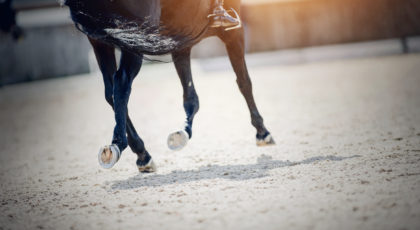When you interview a rider as iconic as Ludger Beerbaum the most difficult decision isn’t what questions to ask, it’s trying to narrow down which of his incredible accomplishments to mention.
Beerbaum is a German master in the truest sense. He has captured every major title in show jumping: Olympics (3 team; 1 individual), World Equestrian Games (twice), World Cup Final (1993), Nations Cup Final (team and individual), European Championships (4 team; 2 individual) — and that’s only his gold medal count.
His start in horses, however, was decidedly less remarkable, Beerbaum revealed on this week’s episode of The Jay Duke Show.
“I was more interested in playing football than riding,” confessed Beerbaum. “I was actually a little afraid of horses when I was nine or ten, but I started taking riding lessons. In Germany you learn dressage and the fundamentals first, I didn’t start jumping until I was about 12. All things considered I started off pretty easy and late in life!”
Surround yourself with the very best
Two major influences on Beerbaum’s career were Paul Schockemöhle and the late Hermann Schridde. (As an aside, if you were to Google “the most successful show jumpers in the world in modern history,” these names would come up. That’s what happens when your country has a history of supporting equestrian sport, breeding and development.)
“When I was about 15 I had the chance to ride in a clinic with Hermann Schridde [German Olympic Champion and coach of the German team.] He invited me to come and ride with him during my school holidays and for about six years I did that.
“He opened the door and introduced me to Paul. He really championed me to Paul and suggested I work for him. However, I then had to convince my parents to let me take a year off from university which wasn’t easy! They wanted me to finish school. But we agreed that if I could make a living with the horses then I wouldn’t have to go back.
“Because of Paul and the environment and opportunities I was given with him, and then [fellow German Olympic Champion] Franke Sloothaak, without a doubt those early days were incredibly influential to my career. Franke was already a star when I came to his stable. When I look back especially now, by watching him and being beaten by him many, many times, it helped me a lot.”
Don’t give up, even if you have doubts
“It took quite a while for me to prove myself and prove to my parents that I would be able to make my living and be competitive and be able to beat the Sloothaaks, the Whittakers… There were times where I had quite a lot of doubts that I would be able to beat these guys. I realized how far ahead they all were.
“You can win once or twice and consider yourself lucky, but to stay on top and keep winning is a whole other story. Even in 1989 when I went out on my own, when you’re trying to find sponsors and set up a barn and organize a string of horses, there are always doubts.
“I’ve been lucky to have been quite young when I won my first Olympic medals. [Editor’s note: Beerbaum won team gold at age 25 in Seoul and individual gold at 29 in Barcelona]. But I was always aiming to win my first Aachen Grand Prix. By the time I won it, I had been second three times. Again you start to doubt yourself that you will actually be able to win it.
“It took me ten years of being in the jump off and finishing as high as second to win the CN International in Calgary at Spruce Meadows. When I finally won it, it was as emotional as winning the Olympic gold.”
Work hard and know when it’s you that needs to change
“I don’t think I have any special skills to have had such an incredible string of horses. I think I was reliable enough and credible enough for people to invest in my career and their horses. In the end it’s quite a bit of luck—things have to go well.
“Ratina, for example, was already super successful with [Piet Raymakers, her former rider] when she came to me, and honestly that was quite hard for me. Usually you can bring a horse along your way, but I really had to adapt to her and that was difficult. She was small and super hot, it took some time for me to adjust to her. I always thought: ‘Well she’s so good, I don’t need to change her, I really owe it to her for me to adjust to her way.’ And that was quite hard.”
The result was nothing short of phenomenal. Beerbaum and Ratina Z won the World Cup Final in 1993, team gold at the WEG in 1994 and the Atlanta Olympics in 1996, then team and individual gold at the 1997 European Championships.
Humble. Hard-working. Brilliant. Watch Ludger Beerbaum’s full interview on The Jay Duke Show to hear what else he shares!


 December 5, 2020
December 5, 2020 

























